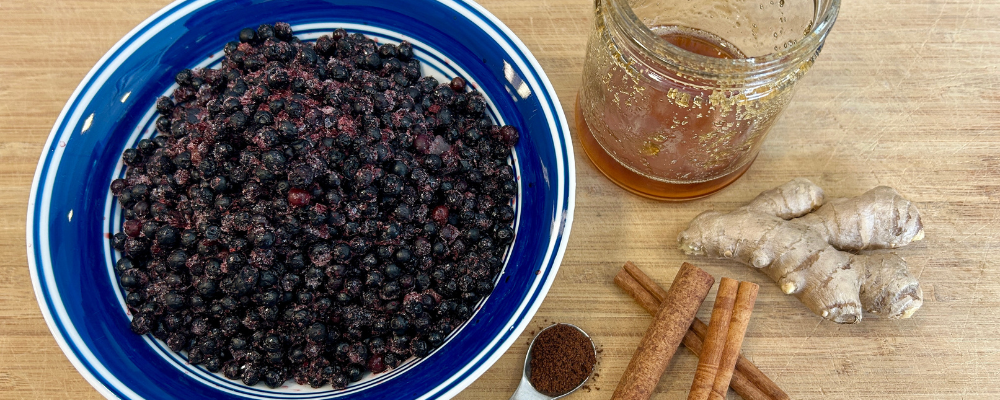
How to Make and Preserve Elderberry Syrup Safely
— By Kate McCarty, Food Systems Professional, University of Maine Cooperative Extension
During cold and flu season many people turn to natural remedies like elderberry syrup and fire cider vinegar to try to prevent illness or lessen symptoms. Elderberries are full of antioxidants and vitamins that in turn may boost your immune system. Homemade elderberry syrup is a great way to reap the benefits of the fruit and can be enjoyed by the spoonful or stirred into tea or sparkling water.
If you’re looking to make your own elderberry syrup, you can use fresh elderberries that you have grown, foraged, or bought. Frozen and dried elderberries are also available to order online or at natural foods stores.
How to Make Your Own Elderberry Syrup
To make your own elderberry syrup, you need to combine fresh, frozen, or dried berries with water and the flavoring ingredients, then bring the mixture to a boil and simmer to reduce it into a syrup. Strain the fruit and other ingredients from the syrup into a sterilized glass jar, then let it cool and add your sweetener of choice. Elderberries are very tart so the syrup is often sweetened with honey, sugar, or maple syrup.
As a note of caution, elderberries and their juice should not be consumed raw, as they contain toxic chemicals called cyanogenic glycosides, which can cause nausea and other severe symptoms if eaten. Fortunately, cooking reduces these toxins and makes the fruit and juice safe. Be sure to follow any heating instructions contained in a recipe for elderberry juice or syrup before consuming.
Elderberry Syrup
- 1 cup dried elderberries or 2 cups fresh or frozen elderberries
- 4 cups of water
- 1 cinnamon stick
- 1/4 teaspoon dried ground clove
- 2 teaspoons fresh ginger, peeled and finely chopped
- 1/2 cup raw honey (or more to taste)
Before you begin, clean the kitchen area and wash your hands with soap and water. In a medium saucepan, combine fresh, frozen, or dried fruit (if using fresh fruit, wash fruit well and pick out any leaves or stems) with water, spices, and honey. Bring to a boil, then reduce the heat and simmer until the liquid is reduced by about half. While the syrup reduces, sterilize a glass pint or quart jar by boiling the jar, fully submerged in water, for 10 minutes. Strain the mixture through a fine-mesh sieve into the sterilized glass jar. Cool to room temperature and add honey. Stir to combine. Apply lid and store in the refrigerator for 2 weeks or freeze for up to 8 months for best quality.
Makes about 2 cups
Adapted from University of Illinois Extension (PDF)
Can I Can My Elderberry Syrup?
The short answer is no; we recommend freezing syrup or juice for longer term storage. Recent research on elderberries shows that they are not acidic enough to preserve by canning like other berries. The pH of several different elderberry varieties was found to be at or above the safe cutoff of 4.6 for canning with a boiling water bath. More research is needed to develop safe canning recipes for elderberries, so in the meantime, we recommend making small batches of syrup or juice that can be kept in the refrigerator and used within two weeks or frozen and used within 6 to 8 months.
